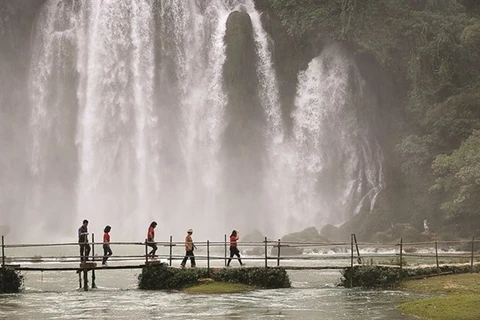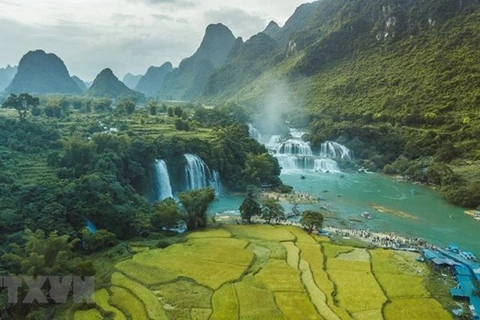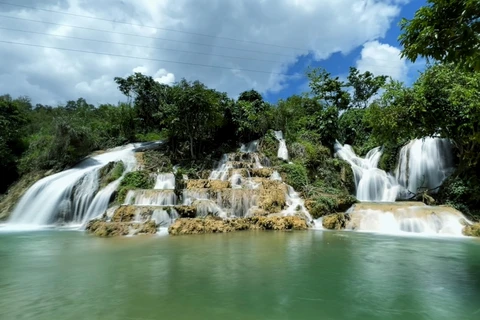Cao Bang (VNA) – A group of experts from the UNESCO led by Artur Sá, UNESCO senior expert and Chairman of the European Global Geopark Network, had a meeting with leaders of the northern province of Cao Bang on August 17 on the re-verification of the title of the Non Nuoc Cao Bang Global Geopark.
The team collected documents about and made field studies of Non Nuoc Cao Bang Global Geopark, and gave a number of recommendations to the locality on measures to further develop the site.
They advised the province to strengthen educational activities on the geopark, particularly among students, mobilise the community’s engagement in developing the site, add explanations about the park in local ethnic languages on information boards erected in the park, and pay greater attention to the protection of biodiversity in the area.
They also asked for Cao Bang’s coordination in preparing documents to apply for hosting the Asia-Pacific Geopark Network Symposium in 2024.
Vice Chairman of the provincial People’s Committee Le Hai Hoa said that recommendations given by the team are helpful for the province in preserving and developing the Non Nuoc Cao Bang Global Geopark.
He expressed hope that the UNESCO experts will help call for more foreign investment in Cao Bang, so that local residents can benefit from the park.
Hoa also revealed the province’s plans to lure investment from the outside, create livelihoods for locals, and promote community-based tourism.
Earlier, the UNESCO working group made field trips to districts in the east, north and west of Cao Bang.
Located in the north of Vietnam, 300km from Hanoi, Non Nuoc Cao Bang has been recognised as a UNESCO global geopark, becoming the second of its kind in Vietnam.
Non Nuoc Cao Bang UNESCO Global Geopark covers 3,000sq.km. It covers six districts of Ha Quang, Tra Linh, Quang Yen, Trung Khanh, Ha Lang, Phuc Hoa, and part of Hoa An, Nguyen Binh and Thach An districts. The geopark is home to nine ethnic groups including Tay, Nung, Mong, Dao and San Chay.
The geopark is an exceptional territory which offers insights into the history of our planet across more than 500 million years through protected sites. Fossils, marine sediment, volcanic and plutonic rocks and minerals are witness to the remarkable evolution and changes of our planet, and they constitute an exceptional geological heritage.
It is also a land of tangible and intangible cultural heritage sites and special historical monuments. The area is also well-known for its high biological diversity with abundant endemic plant and animal species and ecosystems.
There are three main routes to explore the geopark, including going to the east to experience traditional cultures, north to see history and freedom, and west to experience Phia Oac, the mountain of transformations./.
The team collected documents about and made field studies of Non Nuoc Cao Bang Global Geopark, and gave a number of recommendations to the locality on measures to further develop the site.
They advised the province to strengthen educational activities on the geopark, particularly among students, mobilise the community’s engagement in developing the site, add explanations about the park in local ethnic languages on information boards erected in the park, and pay greater attention to the protection of biodiversity in the area.
They also asked for Cao Bang’s coordination in preparing documents to apply for hosting the Asia-Pacific Geopark Network Symposium in 2024.
Vice Chairman of the provincial People’s Committee Le Hai Hoa said that recommendations given by the team are helpful for the province in preserving and developing the Non Nuoc Cao Bang Global Geopark.
He expressed hope that the UNESCO experts will help call for more foreign investment in Cao Bang, so that local residents can benefit from the park.
Hoa also revealed the province’s plans to lure investment from the outside, create livelihoods for locals, and promote community-based tourism.
Earlier, the UNESCO working group made field trips to districts in the east, north and west of Cao Bang.
Located in the north of Vietnam, 300km from Hanoi, Non Nuoc Cao Bang has been recognised as a UNESCO global geopark, becoming the second of its kind in Vietnam.
Non Nuoc Cao Bang UNESCO Global Geopark covers 3,000sq.km. It covers six districts of Ha Quang, Tra Linh, Quang Yen, Trung Khanh, Ha Lang, Phuc Hoa, and part of Hoa An, Nguyen Binh and Thach An districts. The geopark is home to nine ethnic groups including Tay, Nung, Mong, Dao and San Chay.
The geopark is an exceptional territory which offers insights into the history of our planet across more than 500 million years through protected sites. Fossils, marine sediment, volcanic and plutonic rocks and minerals are witness to the remarkable evolution and changes of our planet, and they constitute an exceptional geological heritage.
It is also a land of tangible and intangible cultural heritage sites and special historical monuments. The area is also well-known for its high biological diversity with abundant endemic plant and animal species and ecosystems.
There are three main routes to explore the geopark, including going to the east to experience traditional cultures, north to see history and freedom, and west to experience Phia Oac, the mountain of transformations./.
VNA

























